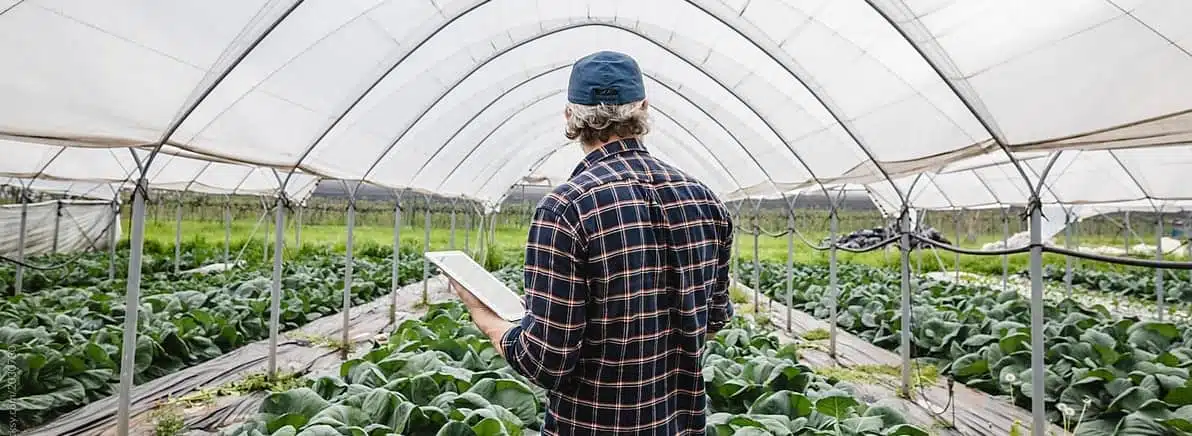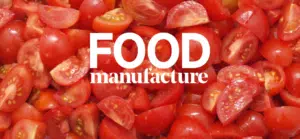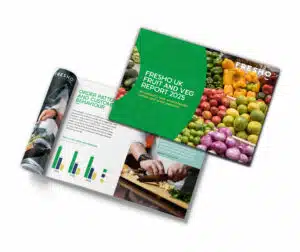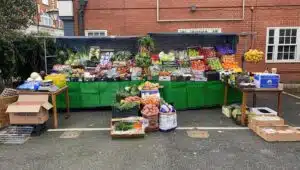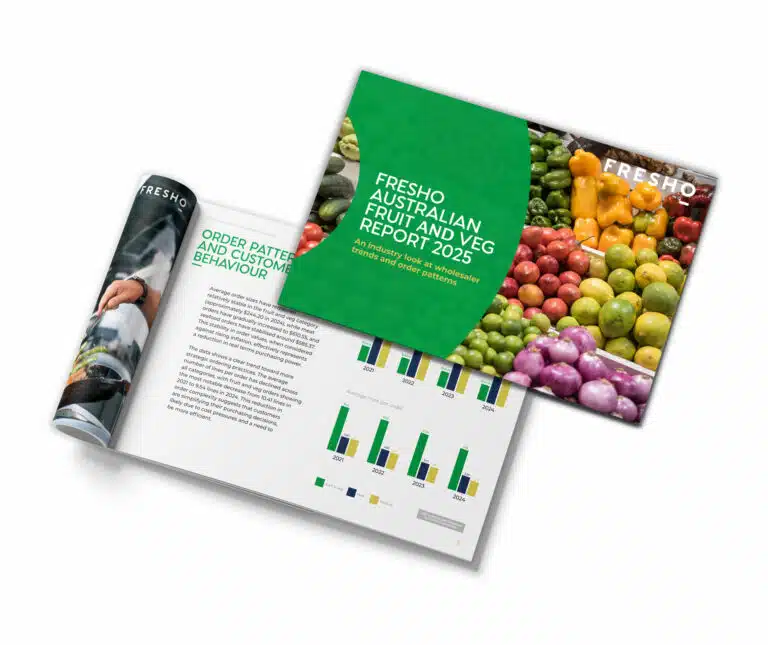With the progression of technology, a digital shift is approaching. Admittedly, it can be daunting as it removes us from our comfort zone but from a business perspective, there is no denying it is fundamental for growth. By adapting to new technology, not only do you simplify the lives of your employees, but your business can stand tall in the competitor market.
We now live in a digital era where whatever we want or need can be obtained with just a few clicks on our beloved smartphones. As food wholesalers, you are no exception to this movement. The food industry is evolving, and it’s the savvy business owners who are adapting by keeping themselves relevant in these competitive times.
In this Guide
What were food wholesalers doing before online ordering?
Before shifting online, the supplier and venue order system looked like this:
- Suppliers provide their customers with specials, prices and product information. This could be via phone call, text, or email and sometimes through a printed product catalogue.
- Customers place an order. If a larger business, they would then get in contact with their sales rep at a later date or if they are a smaller business, the same person would field all of these orders before packing, invoicing and delivering. This means those responsible would hold the burden of placing large orders for a number of venues correctly, and for smaller businesses, the responsibility was even greater.
- The to-and-fro communication begins. Suppliers are notoriously time-poor, meaning getting in contact with them to organise delivery or pay an invoice involves a number of phone calls, emails, and inaudible voicemails. Suppliers jot down notes from this communication and we see a messy order process, which often includes incorrect numbers. Ultimately, inaccurate orders are bound to happen.
- Sales reps manually enter data into spreadsheets. This is where numbers are misentered, overlooked and miscalculations occur. Various studies have reported that 9 out of 10 spreadsheets contain mistakes and the vast majority of these are from human error.
When does a wholesaler start online ordering?
 If there was ever a time to move to online ordering as a wholesaler, the time is now.
It’s rare to see a household that doesn’t have an operating mobile device or internet connection. Technology continues to advance at a rapid pace, with the purpose of making our lives easier dominating the way individuals communicate, learn and think. Business users, like chefs, are also consumers, as they get accustomed to using digital tools in their downtime, they expect digital tools at work.
From the way we network to the way we get our news- the online shift is apparent and shopping is a rising trend. Users are simplifying their purchase processes and the convergence of online transactions or e-commerce is dramatically changing the simple trade of buying and selling, with the pandemic propelling this even further.
When businesses were forced to close their doors, e-commerce opened up an alternative electronic channel and for that reason consumer behaviour, but more specifically, online ordering experienced a paradigm shift. Research shows the B2B industry is “pivoting”, with e-commerce emerging as more than a nice to have- it’s a must-have.
Historically, food wholesalers have been slow to adopt an online ordering system, however, with two years of foundational challenges, wholesalers who recognise the surge in e-commerce as an opportunity to capitalise are now ahead of the game. Put simply, those who don’t move with the fast-growing b2b e-commerce shift may never overcome the imperfections found in traditional food industry market structures.
It begs the question: what’s costlier, upgrading your current process and knowledge base, or going out of business?
If there was ever a time to move to online ordering as a wholesaler, the time is now.
It’s rare to see a household that doesn’t have an operating mobile device or internet connection. Technology continues to advance at a rapid pace, with the purpose of making our lives easier dominating the way individuals communicate, learn and think. Business users, like chefs, are also consumers, as they get accustomed to using digital tools in their downtime, they expect digital tools at work.
From the way we network to the way we get our news- the online shift is apparent and shopping is a rising trend. Users are simplifying their purchase processes and the convergence of online transactions or e-commerce is dramatically changing the simple trade of buying and selling, with the pandemic propelling this even further.
When businesses were forced to close their doors, e-commerce opened up an alternative electronic channel and for that reason consumer behaviour, but more specifically, online ordering experienced a paradigm shift. Research shows the B2B industry is “pivoting”, with e-commerce emerging as more than a nice to have- it’s a must-have.
Historically, food wholesalers have been slow to adopt an online ordering system, however, with two years of foundational challenges, wholesalers who recognise the surge in e-commerce as an opportunity to capitalise are now ahead of the game. Put simply, those who don’t move with the fast-growing b2b e-commerce shift may never overcome the imperfections found in traditional food industry market structures.
It begs the question: what’s costlier, upgrading your current process and knowledge base, or going out of business? What are the benefits of online ordering?
Time efficiency:
- For those in the food supply industry, time is a precious commodity, particularly with razor-thin profit margins. Online ordering tackles this issue for suppliers and creates a more pleasurable experience for consumers who love a convenient, fast and effortless experience while deciding on a purchase or looking for any product information.
- Save time on manual data entry. Get rid of orders via email, text and phone call and focus your attention on more important aspects of your business, like growth.
Reducing Costs:
- Accurate ordering and fewer costly mistakes lead to credit notes.
- Moving with a trend that is likely to stay, means you can attract more customers who see a technology shift as a favourable business decision.
Organise your orders:
- Receive and view all your orders in one place.
Sustainability:
- Globally, roughly one-third of the food that is grown, caught and manufactured, ends up in wastage. This is a concerning statistic and the rationale behind software for the food industry. With online ordering, you can reduce waste by eliminating order errors on both the supplier and venue side by streamlining the end-to-end order process.
- Suppliers also generate extortionate amounts of paper waste. An online platform is completely paperless.
- Consumers care about sustainability when choosing food. Australia and the world are focusing on sustainability with an Australian government initiative currently in place to halve food waste by 2030. As we move closer to our goal, demonstrating your awareness of sustainability can make your brand even more powerful when trying to build a stronger relationship with customers who are environmentally conscious.
Why does digitalising my business matter?
At its core, digitalising is important for a food wholesaler’s success.
To understand this, food wholesalers need to forget digitalising as being an introduction to technology but envision it as a strategy to propel their business forward. No business, small or large, can be successful without energised employees who feel their work is purposeful.

Ultimately, a business choosing not to digitalise and giving preference to manual processes is a business not recognising its employees. These days, nurturing your employees’ well being is more important than ever, with studies suggesting that it reduces absenteeism, and increases employee engagement, productivity and morale. Those who address the bones of a company will see success follow.
Are other businesses in the food industry digitalising?
Nowadays, there’s no industry or sector that hasn’t been touched by the digital revolution. At all levels, the food industry has been faced with a number of challenges and has no choice but to embrace technology to focus on optimising their processes and building resilience in their supply chains.
It’s food retail that has evolved the most with its e-commerce landscape and incorporation of more digital platforms. QR ordering has been a post-pandemic hit that encourages guests to become their own servers while increasing customer experience at the same time.
A small number of food manufacturers have adopted technologies. However, there is an increasing need to evolve for the industry’s future success. The use of machines in food manufacturing will continue to ensure quality, affordability and safety issues, for example, the automation of the meat cutting process may lower workplace injuries or vertical farming to decrease travel time/cost.
What is stopping wholesale suppliers from online ordering?
For too long food suppliers have been doing this on their own. When a process is so embedded in your psyche, an unfamiliar system can seem unapproachable.
Trust: The idea of enabling data sharing can appear to be giving away too much information for competitors to capitalise on. However, online software has no benefit in sharing this information and in most cases, storing data in software can lead to data-driven decisions which will benefit your business.
Prefer an in-person interaction: Suppliers believe that shifting online can erase in-person interactions. However, online ordering can work harmoniously with in-person interactions as it ensures inefficiencies in human error are reduced and less time is spent on repetitive/mundane tasks allowing for more time to enhance and build relationships with customers.
Ease of use: Moving your business to the internet can seem like a daunting prospect for those who haven’t trialled a demo. However, the customers who make the online shift describe the process as “efficient”.
Time: Food suppliers are consistently strained for time. Putting aside just a couple of hours to research and demo a software initially seems out of the question. This is quickly offset by the time saved once they implement an online ordering system, suppliers have found themselves “coming in an hour later in the morning”.
Comparative price: Suppliers are concerned that customers can compare competitive prices easily. However, this issue can also occur offline where customers can compare prices through paper-based product lists. Additionally, some software are closed market, meaning both their customers and pricelists are protected.
How can I get started with online ordering?

At Fresho, the set up is easy as we take care of most of it for you. You have the training and implementation support to facilitate your whole setup, from trialling a demo to downloading the application and using it. You will never be left unaccompanied or with your questions unanswered.
Then, as an easy-to-use platform for both your desktop and mobile, you and your staff can access Fresho anywhere, anytime, on any device.
